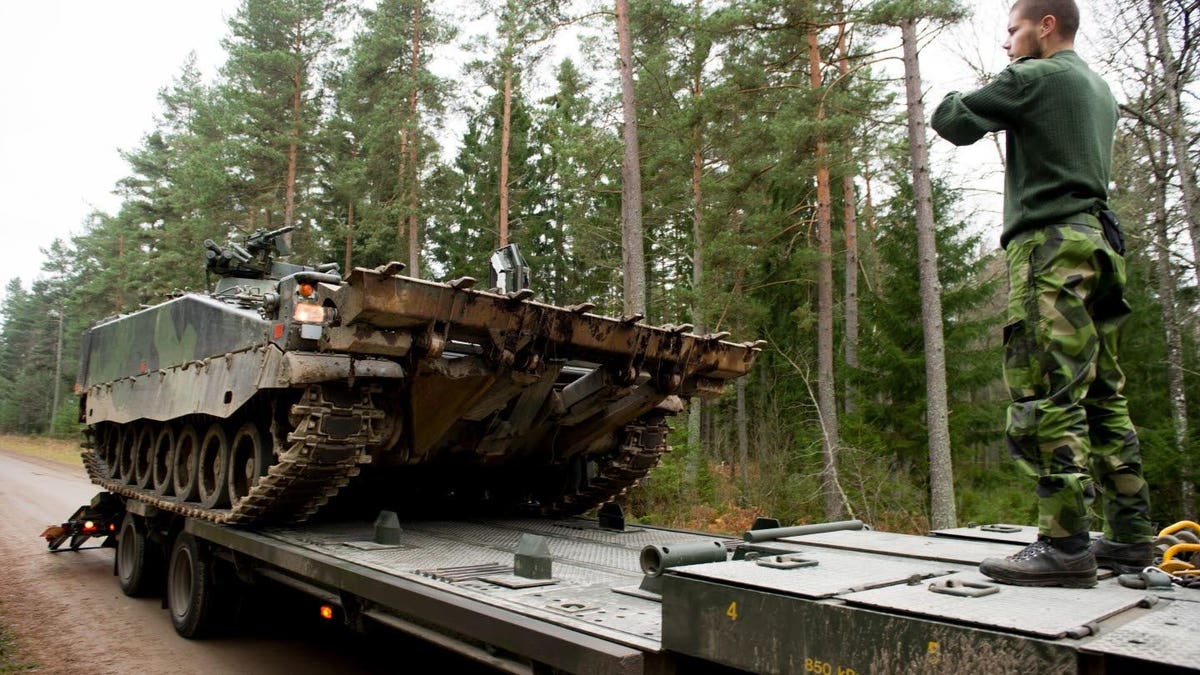Surprise! When Sweden donated tanks, fighting vehicles and howitzers to equip around half of a Ukrainian army brigade, it also gave the Ukrainians at least one very valuable armored recovery vehicle.
We know this not because Stockholm announced the transfer, but because a Getty photographer snapped a pic of a Swedish-made Bärgningsbandvagn 90 ARV somewhere in Ukraine this week.
Still, it makes sense. Six weeks into Ukraine’s southern counteroffensive, recovery vehicles are more important than ever. A lot of Ukrainian vehicles are getting hit—by mines, in particular—but not a lot of Ukrainian vehicles are getting destroyed.
And because they prioritized the acquisition of a large fleet of ARVs, Ukrainian forces can recover many of the damaged vehicles, tow them to rear-area repair shops and fix them up.
The Bgbv 90 ARV is special. It’s smaller and lighter than many of Ukraine’s ARVs, making it more suitable for crowded urban and forested battlefields than a bigger, more powerful ARV might be.
The Bgbv 90 basically is a 41-ton CV90 infantry fighting vehicle with a crane in place of its turret. Fitted with winches and a stabilizing dozer blade, a four-person Bgbv 90 can tow immobilized vehicles weighing as much as 79 tons.
The larger Büffel ARV that Swedish forces also use can tow 98 tons, but the 19-ton difference between it and the Bgbv 90 shouldn’t matter all that much for Ukrainian forces. For starters, the Ukrainians also have at least three Büffels they got from Canada and Germany, as well as other heavy ARVs including American-made M-88s and British Challenger ARVs.
And Kyiv almost certainly has assigned its Bgbv 90s to the Ukrainian army’s new 21st Mechanized Brigade, which also operates the 50 CV90s, 10 Stridsvagn 122 tanks and eight Archer howitzers Sweden donated to Ukraine. The Bgbv 90 should be able to tow every combat vehicle in the 21st Brigade’s inventory.
The 21st Brigade has been inching toward the front line west of Kreminna in northeastern Ukraine, where Russian forces in recent weeks have launched small-scale attacks they clearly hope will distract the Ukrainians from their counteroffensive in the south.
But the 21st hasn’t yet seen a lot of direct combat. Until it does, the Bgbv 90 crews might not have a lot to do. But once the brigade makes direct contact with the Russians—and especially if the brigade goes on the attack—expect to see a lot of damaged and abandoned CV90s and Strv 122s.
Those vehicles are not necessarily total write-offs. Western combat vehicle design prioritizes protection. Damage that immobilizes a vehicle doesn’t always destroy the vehicle or—more importantly—kill the crew.
Consider Ukraine’s growing fleet of American-made M-2 infantry fighting vehicles. M-2s belonging to the Ukrainian army’s 47th Mechanized Brigade have been in the thick of the hardest fighting in southern Ukraine’s Zaporizhzhia Oblast.
The analysts at Oryx, an open-source intelligence collective, have counted no fewer than 35 damaged M-2s. But just a dozen of the 33-ton vehicles are so badly damaged as to be irrecoverable, a U.S. official told The Washington Post.
The process of retrieving, repairing and returning to service a battle-damaged vehicle begins with an armored recovery vehicle—a Bgbv 90, for example—rolling onto the battlefield, winching out the mired vehicle and towing it to the rear.
If the damage is light, mechanics from the brigade that owns the damaged vehicle might fix it up by themselves. Heavier damage might require logistics troops to hoist the vehicle onto a heavylift truck and drive it to a repair depot in Ukraine or a neighboring country.
In either case, the more ARVs the Ukrainians have, the faster they can fetch and fix damaged vehicles. The demand for ARVs was extreme before Ukraine began acquiring hundreds of Western-made tanks and IFVs. It’s even more extreme now that many Ukrainian brigades are riding in combat vehicles that tend to get damaged and immobilized rather than destroyed.
Before Russia widened its war on Ukraine 17 months ago, Ukraine had just three dozen or so Soviet-made ARVs. As the wider war ground on, Kyiv’s foreign allies pledged no fewer than 36 additional ARVs. The Ukrainians also have built ARVs from scratch on the hulls of captured Russian T-62 tanks.
It’s unclear how many Bgbv 90s Sweden gave Ukraine. As of 2022, the Swedes had 26 of the priceless vehicles.
Read the full article here





